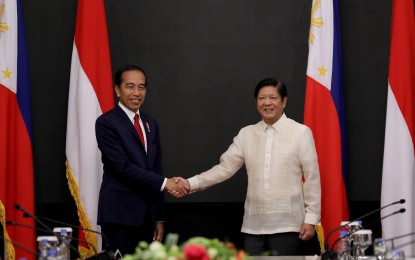
BILATERAL MEETING. President Ferdinand R. Marcos Jr. holds a bilateral meeting with Indonesian President Joko Widodo at Malacañan Palace in Manila on Wednesday (Jan. 10, 2024). During the meeting, Marcos and Widodo discussed the recent developments in the South China Sea and affirmed the importance of international laws, including the United Nations Convention on the Law of the Sea. (PNA Photo by Rey Baniquet)
MANILA – President Ferdinand R. Marcos Jr. and Indonesian President Joko Widodo on Wednesday stressed the importance of upholding the United Nations Convention on the Law of the Sea (UNCLOS) as they discussed the recent developments in the South China Sea (SCS).
During their bilateral meeting at Malacañan Palace in Manila, Marcos and Widodo acknowledged that complying with the UNCLOS is crucial to maintain peace and stability in the oceans and the seas, including the SCS.
“President Widodo and I held a fruitful and honest discussion on regional events of mutual interest, such as the developments in the South China Sea and ASEAN (Association of Southeast Asian Nations) cooperation and initiatives,” Marcos said in a joint statement delivered after his bilateral meeting with Widodo.
“The Philippines and Indonesia affirmed our insistence on the universality of UNCLOS, which sets out the legal framework that governs all activities in the oceans and in the seas,” he added.
Widodo said he and Marcos also emphasized the need to strengthen ASEAN Unity and Centrality, as well as to uphold the principles of international law and become a “positive force for peace, sustainability and prosperity.”
In November last year, Marcos urged his fellow ASEAN leaders to craft a new code of conduct (COC) in the SCS, considering the slow negotiations on the proposed sea code between the 10-man regional bloc and China.
Marcos’ call came amid China’s provocative actions in the SCS.
China, the Philippines, and several other littoral states have competing claims in the SCS, with Beijing claiming about 80 percent of the contested waters.
Addressing regional challenges
In his remarks before his bilateral meeting with Widodo, Marcos said the Philippines and Indonesia must work together to address the present challenges in the region.
Marcos made the call, as he recognized Indonesia as one of the Philippines' “closest friends and regional partners.”
“Our many commonalities in geography, history and culture have fostered deeper and more comprehensive engagement at various levels, spanning defense and security, maritime operations, trade and investment, tourism, people-to-people exchanges, amongst many others, and I might add, a strengthening government-to-government relationship,” he said.
"As like-minded developing nations, the Philippines and Indonesia both aspire for the ASEAN Commonality that is peaceful, stable and prosperous. As neighbors, we must remain united in addressing the many challenges that our region now faces,” Marcos added.
Widodo said he is “delighted” about the “positive” progress on the implementation of the two countries’ action plan.
He, however, acknowledged that the Philippines and Indonesia need to take more concrete steps to strengthen their political, security, and border cooperation.
“There are many things that still need to be improved,” Widodo said, adding that he seeks the Marcos administration's support for the Philippine Navy's acquisition of submarine warfare aircraft from Indonesia. (PNA)
